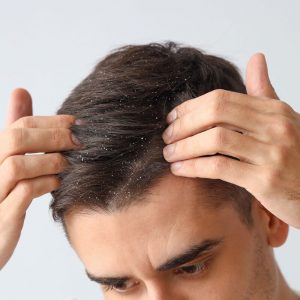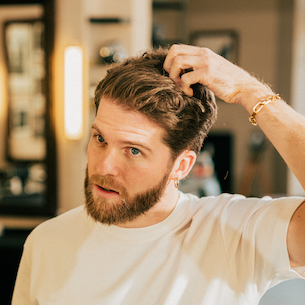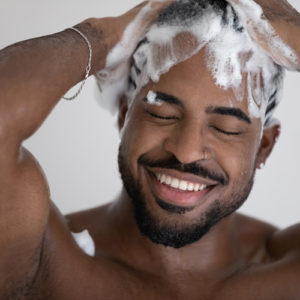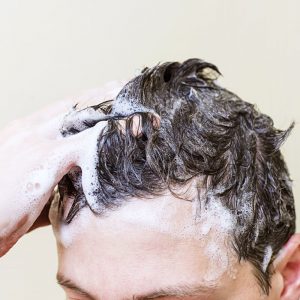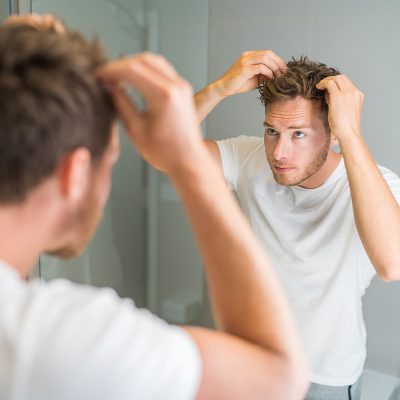Schuppen loswerden – wertvolle Tipps gegen trockene & fettige Schuppen
So bringst du deine Kopfhaut wieder ins Gleichgewicht
Schuppen sind kein seltenes, aber lästiges Problem. Sie entstehen, wenn sich die obere Hautschicht erneuert. Dabei werden alte, abgestorbene Hautzellen abgestoßen, um Platz für neue Hautzellen zu schaffen. Die abgestorbenen Schüppchen sind meist so klein, dass sie gar nicht auffallen. Erst wenn sich die Zellen z.B. zu schnell erneuern und austrocknen, können die weißen Flocken auf deine Schultern herabrieseln. Doch auch eine zu fettige Haut, kann Schuppen verursachen. Was du dagegen tun kannst und wie du trockene und fettige Schuppen loswirst und vorbeugen kannst, erklären wir dir hier.

Ursachen von Schuppen am Kopf
Schuppen können unterschiedliche Ursachen haben: Pilzbefall, Stress, Umwelteinflüsse, wie zu trockene Heizungsluft, Fehlernährung oder aber auch zu heißes Föhnen sowie die Verwendung falscher Pflege- und Stylingprodukte.
Es lohnt sich also herauszufinden, was die Ursachen sind, um erfolgreich gegen Schuppen vorzugehen. Da sowohl zu trockene als auch zu fettige Kopfhaut Schuppen auslösen kann, solltest du zunächst beobachten, ob deine Kopfhaut eher trocken oder fettig ist. Verlierst du viele feine Schuppen neigst du zu einer trockenen Kopfhaut. Bei einer fettigen Kopfhaut sind die Schuppen meist größer und bleiben an deiner Kopfhaut haften

Schuppen bei fettiger Kopfhaut – was tun?
Bei Schuppen, die auf einer öligen Kopfhaut auftreten, ist meist eine zu hohe Talgproduktion (Fettbildung) die Ursache. Die abgestorbenen Hautzellen verkleben zu Schuppen und bleiben auf der Kopfhaut haften, bis diese nicht mehr richtig atmen kann und anfängt zu jucken.
Teebaumöl gegen fettige Schuppen
In diesem Fall kannst du die fettigen Schuppen auf eine natürliche Weise bekämpfen, indem du etwas Teebaumöl mit Wasser versetzt und die Tinktur vor der Haarwäsche anwendest. Diese sollte kurz einwirken und mit einem milden Shampoo ausgewaschen werden. Diese Prozedur wiederholst du am besten 2–3 Mal die Woche; aber nicht öfter, denn das Teebaumöl neigt dazu, die Haut auszutrocknen. Eine regelmäßige Kur mit Kräuterölen reguliert die Talgproduktion und pflegt die Kopfhaut. Neben Teebaumöl eignen sich z.B. Salbei, Thymian oder Brennnessel–Blätter. Dazu kannst du die Kräutermischung mit heißem Wasser aufgießen, einige Minuten ziehen lassen und anschließend als Spülung nach der Haarwäsche vermeiden. Alternativ kannst du ein spezielles Anti-Schuppen-Shampoo verwenden, um das Fett zu reduzieren. Die darin enthaltenen Inhaltsstoffe sind speziell dafür entwickelt, Pilze und Bakterien zu bekämpfen. Diese sind jedoch häufig künstlich und nicht ungefährlich.

Schuppen bei trockener Kopfhaut – was hilft?
Bei einer trockenen Kopfhaut, die von Schuppen befallen ist, sind meistens Fehlernährung, Heizungsluft, Klimaanlagen oder falsche Pflege- und Stylingprodukte der Auslöser.

Das hilft bei trockenen Schuppen:
Bei einer trockenen Kopfhaut mit Schuppen eignen sich milde Shampoos, mit hochwertigen, pflanzlichen Inhaltsstoffen, die eine rückfettende Wirkung haben, um die natürliche Talgproduktion zu unterstützen. Solche Shampoos befreien deine Kopfhaut schonend von Schuppen, ohne sie dabei zu strapazieren. Besonders gut sind Shampoos, die Wirkstoffe wie Kamille, Rosmarin oder Hafer-Extrakte beinhalten, da diese die Kopfhaut sanft reinigen und zusätzlich beruhigen. Vorsicht bei herkömmlichen Anti-Schuppen-Shampoos! Denn diese können bei einer trockenen Kopfhaut die Schuppenbildung sogar fördern. Unser Tipp: Wasche deine Haare, wenn möglich, nicht täglich.

Olivenöl gegen Schuppen
Ein paar Tropfen Olivenöl auf die Kopfhaut träufeln, einmassieren und über Nacht einwirken lassen. Morgens mit einem milden Shampoo wieder auswaschen.
Aloe Vera
Aloe Vera wirkt antibakteriell und gleichzeitig feuchtigkeitsspendend. Um deine trockene Kopfhaut zu beruhigen, presst du den Saft eines Aloe-Vera-Blattes aus und verteilt ihn gleichmäßig auf deiner Kopfhaut.

So beugst du Schuppen vor: 6 Tipps und Hausmittel gegen Schuppen
Viele Männer handelt erst, wenn es zu spät ist und die Schuppen bereits sichtbar sind. Dabei ist die Pflege unserer Kopfhaut genauso wichtig wie unsere Gesichts- und Körperpflege.

#1: Haare kämmen & Schuppen lösen
Nicht wirklich ein Hausmittel, aber dennoch wichtig. Wir empfehlen dir, deine Haare vor dem Waschen, sanft mit einem feinen Kamm zu kämmen. Dies regt die Durchblutung an, sodass sich die Schuppen von der Kopfhaut lösen und gut auswaschen lassen können. Nach dem Waschen solltest du deine Haare gründlich ausspülen – je länger, desto besser – und lufttrockenen lassen. Am besten keine Stylingprodukte verwenden oder nur welche mit hochwertigen Inhaltsstoffen, die deine Kopfhaut nicht unnötig überstrapazieren. Wichtig ist auch, dass du deinen Kamm häufig und sorgfältig reinigst.

#2 Apfelessig gegen Schuppen
Apfelessig eignet sich ebenfalls für die Hautpflege, es pflegt und beruhigt die Haut und wirkt gleichzeitig antibakteriell. Mische dazu 1 Liter Wasser mit 3–4 Esslöffeln Apfelessig. Anschließend gießt du die Mischung nach der Haarwäsche über die noch nassen Haare. 2-3 Minuten einwirken lassen, mit lauwarmem Wasser auszuspülen, fertig.

#3 Haarmaske gegen Schuppen – Öl-Kur über Nacht
Zusätzlich kannst du natürliche Öle auf dein Haar träufeln und sie als Kur anwenden, um gegen Schuppen vorzugehen. Neben Teebaumöl und Olivenöl, eignen sich auch Sesam- und Kokosöl optimal gegen Schuppen.
Kokosöl gegen Schuppen
Dieses Multitalent kann so gut wie für alles verwendet werden. Neben seinen Wirkungen für schöne Haut und schönes Haar wirkt es antibakteriell und auch heilend bei Schuppen und Juckreiz und versorgt die Haut zusätzlich mit Feuchtigkeit.

Sesamöl gegen Schuppen
Sesamöl hilft bei der Vorbeugung von Haarausfall und bekämpft Schuppen. Es wirkt antioxidativ, antibakteriell, entzündungshemmend und pilzbekämpfend. Es ist jedoch sehr fettig und sollte nur auf einer sehr trockenen Kopfhaut angewendet werden.
Du kannst die Öle einfach vor der Haarwäsche auftragen und eine halbe Stunde einwirken lassen. Danach wäschst du es ganz einfach mit einem milden Shampoo wieder raus. Für eine noch intensivere Wirkung kannst du das Öl, je nach Belieben, auch über Nacht einwirken lassen.
#4 Ernährung
Ein Vitamin- oder Mineralstoffmangel kann die Schuppenbildung verstärken. Eine Ernährungsumstellung kann da helfen. So hilft z.B. Zink, enthalten in Bohnen, Haferflocken und Nüssen gegen Schuppen und Akne. Auch B-Vitamine, enthalten in Linsen, Eier und Joghurt helfen gegen Schuppen und verbessern gleichzeitig dein Hautbild. Gesunde Fette, wie in Avocados, Samen und Nüssen helfen gegen trockene Haut und können so die Schuppenbildung vorbeugen.

#5 Backpulver & Natron
Backpulver wirkt wie ein Peeling für die Kopfhaut, da es die abgestorbenen Hautschuppen entfernt und den überschüssigen Talg aufnimmt. Dazu einfach nach dem Waschen eine Handvoll Backpulver auf die Kopfhaut geben, gut einmassieren und anschließend mit lauwarmen Wasser auswaschen.
#6 Naturjoghurt
Auch Naturjoghurt kann dabei helfen, deine Kopfhaut wieder ins Gleichgewicht zu bringen. Dazu trägst du 2 Mal die Woche eine große Portion Naturjoghurt auf deiner Kopfhaut auf und lässt diese etwa 15 Minuten einwirken. Anschließend spülst du die Haare mit einem milden Shampoo aus.
Das solltest du bei Schuppen meiden
➔ Haare nicht täglich waschen.
➔ Haare nicht zu warm zu waschen und nicht zu heiß föhnen.
➔ Keine Haarprodukte mit gefährlichen Inhaltsstoffen, wie Parabenen, Duftstoffen und Tensiden anwenden. Setze hier lieber auf Naturkosmetik.
➔ Haare nicht trocken rubbeln oder zu heftig kämmen, denn das regt die Talgdrüsen zu erhöhter Fettproduktion an.
➔ Kamm und Bürste häufiger und sorgfältiger reinigen.
FAQ:
Was hilft gegen trockene Kopfhaut?
Wenn die Kopfhaut austrocknet, ist ihre Fett-Feuchtigkeitsproduktion nicht mehr im Gleichgewicht. Dies kann mehrere Ursachen haben. Auch hier gilt: Setze auf milde Shampoos und vermeide Anti-Schuppen-Shampoo, diese trocknen die Haut meistens nur noch mehr aus. Haare nicht zu heiß waschen und föhnen, da heißes Wasser der Kopfhaut Feuchtigkeit entzieht. Lasse deine Haare daher auch gerne lufttrockenen, statt zu föhnen. Zusätzlich dazu kannst du noch eine Öl-Kur machen. Nicht jeden Tag Haare waschen, um den natürlichen Schutzfilm zu regenerieren. Verwende Aloe vera, denn das Gel beruhigt die trockene Kopfhaut und lindert den Juckreiz.
Warum bekommen viele Männer auch Schuppen im Bart?
Auch im Bartbereich können Schuppen sichtbar werden. Ähnlich wie bei der Kopfhaut entstehen Schuppen im Bart, wenn die Haut aus dem Gleichgewicht gerät und der Feuchtigkeitshaushalt gestört ist. Das kann unterschiedliche Ursachen haben, wie eine erhöhte Talgproduktion, falsche Pflegeprodukte oder trockene Heizungsluft. Versuch’s mal mit Bartöl – das pflegt nicht nur die Haut unter deinem Bart, sondern reduziert den Juckreiz und macht die Barthaare weicher. Mehr zum Thema Schuppen im Bart erfährst du hier.
Warum juckt eine schuppige Kopfhaut?
Trockene, schuppige Kopfhaut ist häufig ein Zeichen, dass die natürliche Talgproduktion der Haut aus dem Gleichgewicht geraten ist. Die Folge: Die Kopfhaut fängt an zu jucken und ist teils sogar gerötet oder rissig.
Ich hab alles Mögliche versucht, aber die Schuppen bleiben!
Unsere Tipps versprechen keine garantierten Erfolge. Was bei deinem Kumpel wunderbar funktioniert, muss bei dir nicht genauso klappen. Außerdem dauert es ein wenig, bis das Gleichgewicht deiner Haut wiederhergestellt ist. Sollte nach einigen Wochen keine Besserung erfolgen, können Schuppen Anzeichen einer Krankheit sein (keine Panik, das nur in seltenen Fällen).
Wann solltest du einen Arzt aufsuchen?
Nach etwa vier bis sechs Wochen Behandlung sollte sich der Zustand deiner Kopfhaut gebessert haben. Wenn nicht, solltest du einen Hautarzt aufsuchen und überprüfen lassen, ob es nicht doch etwas Ernsteres ist, als nur Schuppen. Zu Krankheiten, die sich durch Kopfschuppen bemerkbar machen können, zählen z.B. Neurodermitis, Schuppenflechte und Pilzerkrankung.
Welches Shampoo hilft am besten gegen Schuppen und was solltest du beim Kauf eines Anti-Schuppen-Shampoo beachten?
Welches Shampoo am besten gegen Schuppen wirkt, kommt auf deine individuellen Bedürfnisse an. Generell solltest du beim Kauf des Anti-Schuppen-Shampoos darauf achten, dass dies frei von Silikonen, Parabenen und weiteren schädlichen Inhaltsstoffen ist.
Sharing is caring!
Hast du häufig Schuppen? Was hilft bei dir am besten? Wir freuen uns, von dir auf facebook und Instagram zu hören!
Dein(e) Brooklyn Soap Team/Academy
Entdecke weitere Haarpflege-Tipps in unserer Academy
Related product

Hair Essentials
€ $33.00
€ $30.00
